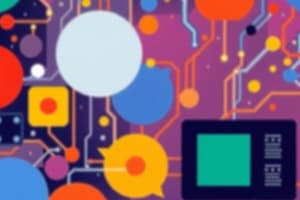Podcast
Questions and Answers
Koks yra ICT komponentas, kuris apima fizinius kompiuterio sistemos elementus?
Koks yra ICT komponentas, kuris apima fizinius kompiuterio sistemos elementus?
- Techninė įranga (correct)
- Tinklai
- Duomenys
- Programinė įranga
ICT apima tik programinę įrangą ir tinklus.
ICT apima tik programinę įrangą ir tinklus.
False (B)
Kokie yra du ICT naudojimo pavyzdžiai versle?
Kokie yra du ICT naudojimo pavyzdžiai versle?
Automatizavimas, duomenų analizė
ICT apima masines __________ technologijas, naudojamas informacijai rinkti, apdoroti, saugoti ir perduoti.
ICT apima masines __________ technologijas, naudojamas informacijai rinkti, apdoroti, saugoti ir perduoti.
Suderinkite ICT programas su jų taikymo sritimis:
Suderinkite ICT programas su jų taikymo sritimis:
Kuri iš šių programinės įrangos rūšių nėra operacinė sistema?
Kuri iš šių programinės įrangos rūšių nėra operacinė sistema?
ICT techninė įranga apima tik kompiuterius.
ICT techninė įranga apima tik kompiuterius.
Kokią naudą gali duoti ICT švietimo srityje?
Kokią naudą gali duoti ICT švietimo srityje?
Kokios iš šių parinkčių yra teigiamos ICT įtakos?
Kokios iš šių parinkčių yra teigiamos ICT įtakos?
Mobilioji technologija apima tik stacionarius kompiuterius.
Mobilioji technologija apima tik stacionarius kompiuterius.
Kas yra pagrindinis dirbtinio intelekto (AI) tikslas?
Kas yra pagrindinis dirbtinio intelekto (AI) tikslas?
____________________ leidžia duomenų saugojimą ir apdorojimą nuotoliniuose serveriuose.
____________________ leidžia duomenų saugojimą ir apdorojimą nuotoliniuose serveriuose.
Sutapinkite šias ICT sritis su jų pagrindinėmis savybėmis:
Sutapinkite šias ICT sritis su jų pagrindinėmis savybėmis:
Kokie yra pagrindiniai iššūkiai, susiję su ICT plėtra?
Kokie yra pagrindiniai iššūkiai, susiję su ICT plėtra?
Visi žmonės turi vienodą prieigą prie ICT technologijų.
Visi žmonės turi vienodą prieigą prie ICT technologijų.
Kas apima etinius klausimus, susijusius su duomenų privatumu ir algoritmų šališkumu?
Kas apima etinius klausimus, susijusius su duomenų privatumu ir algoritmų šališkumu?
Flashcards
IKT apibrėžimas
IKT apibrėžimas
Informacinių ir ryšių technologijų (IKT) sąvoka apima visas technologijas, naudojamas informacijai rinkti, apdoroti, saugoti ir perduoti.
IKT įranga
IKT įranga
Tai fizinės IKT sistemos dalys, tokios kaip kompiuteriai, išmanieji telefonai ir tinklai.
IKT programinė įranga
IKT programinė įranga
Programavimo instrukcijos, leidžiančios kompiuteriui atlikti užduotis.
IKT tinklai
IKT tinklai
Signup and view all the flashcards
IKT duomenys
IKT duomenys
Signup and view all the flashcards
IKT naudotojai
IKT naudotojai
Signup and view all the flashcards
Ryšių taikymas
Ryšių taikymas
Signup and view all the flashcards
Švietimo taikymas
Švietimo taikymas
Signup and view all the flashcards
Informacinių ir ryšių technologijų (IRT) poveikis
Informacinių ir ryšių technologijų (IRT) poveikis
Signup and view all the flashcards
Skaitmeninis atotrūkis
Skaitmeninis atotrūkis
Signup and view all the flashcards
IRT saugumas
IRT saugumas
Signup and view all the flashcards
Mobilioji technologija
Mobilioji technologija
Signup and view all the flashcards
Debesų kompiuterija
Debesų kompiuterija
Signup and view all the flashcards
Didieji duomenys
Didieji duomenys
Signup and view all the flashcards
Dirbtinis intelektas (DI)
Dirbtinis intelektas (DI)
Signup and view all the flashcards
Etiški IRT klausimai
Etiški IRT klausimai
Signup and view all the flashcards
Study Notes
Introduction to ICT
- ICT stands for Information and Communication Technology.
- It encompasses all technologies used to collect, process, store, and communicate information.
- This includes hardware like computers, smartphones, and networks, as well as software applications used for various purposes.
- The rapid advancement in ICT has significantly impacted modern society, businesses, and everyday life.
Components of ICT
- Hardware: Physical components of a computer system, including the central processing unit (CPU), memory, storage devices (hard drives, SSDs), input devices (keyboard, mouse, scanner), and output devices (monitor, printer). Mobile devices like smartphones and tablets are also considered part of ICT hardware.
- Software: Sets of instructions that tell the computer what to do. This includes operating systems (like Windows, macOS, Linux), applications (word processors, spreadsheets, games), and programming languages.
- Networks: Systems connecting multiple devices to share data and resources. This includes the internet, local area networks (LANs), and wide area networks (WANs).
- Data: Raw facts, figures, and other kinds of information collected, processed, stored, and transmitted via ICT. Data is often organized, analyzed, and presented in various ways, such as tables, charts, and graphs.
- People: Individuals involved in using and developing ICT systems. Users create data, interact with the technology, and solve problems. IT professionals maintain, support, design, and adapt ICT solutions.
Applications of ICT
- Communication: ICT facilitates instant communication across vast distances via email, messaging apps, video conferencing, and social media.
- Education: ICT enhances learning experiences through online courses, interactive simulations, educational software, and access to vast online resources.
- Business: ICT automates business processes, streamlines operations, supports data analysis, improves customer service, and enables e-commerce.
- Healthcare: ICT supports electronic health records, telehealth consultations, medical imaging analysis, and drug discovery.
- Government: ICT improves efficiency in government services, facilitates citizen interactions, and enables effective data management.
- Entertainment: ICT provides diverse media consumption options, from streaming movies and music to online gaming and virtual reality experiences.
- Research: ICT facilitates data collection, analysis, and dissemination in scientific research. Tools like software for data analysis and collaborative platforms play a key role.
Impacts of ICT
- Positive Impacts: Enhanced communication, increased productivity, greater access to information and education, economic growth, and improved quality of life in many aspects.
- Negative Impacts: Digital divide (unequal access to ICT), cyberbullying, privacy concerns, security threats, job displacement in certain sectors, and potential for misinformation.
- Ethical Considerations: Issues related to data privacy, security, intellectual property rights, and responsible use of technology need to be addressed.
Key Trends in ICT
- Mobile Technology: Increased use of smartphones and tablets, leading to mobile computing.
- Cloud Computing: Data storage and processing performed on remote servers, accessible via the internet.
- Big Data: Analysis of vast amounts of data to extract insights and trends.
- Artificial Intelligence (AI): Development of computer systems capable of performing tasks that typically require human intelligence. This includes machine learning, natural language processing, and computer vision.
- Internet of Things (IoT): Network of interconnected devices that collect and exchange data.
- Cybersecurity: Protecting networks and data from cyber threats like hacking, malware, and phishing.
- Sustainable ICT: Developing and deploying ICT solutions that minimize environmental impact and promote energy efficiency.
Challenges in ICT Development
- Digital Divide: Ensuring equal access to ICT for all individuals and communities.
- Skills Gap: Training and development programs to equip individuals with the necessary skills for ICT-related professions.
- Security Threats: Developing robust security measures to protect systems and data from cyberattacks.
- Ethical Concerns: Addressing ethical dilemmas related to data privacy, bias in algorithms, and the responsible use of AI.
Studying That Suits You
Use AI to generate personalized quizzes and flashcards to suit your learning preferences.




